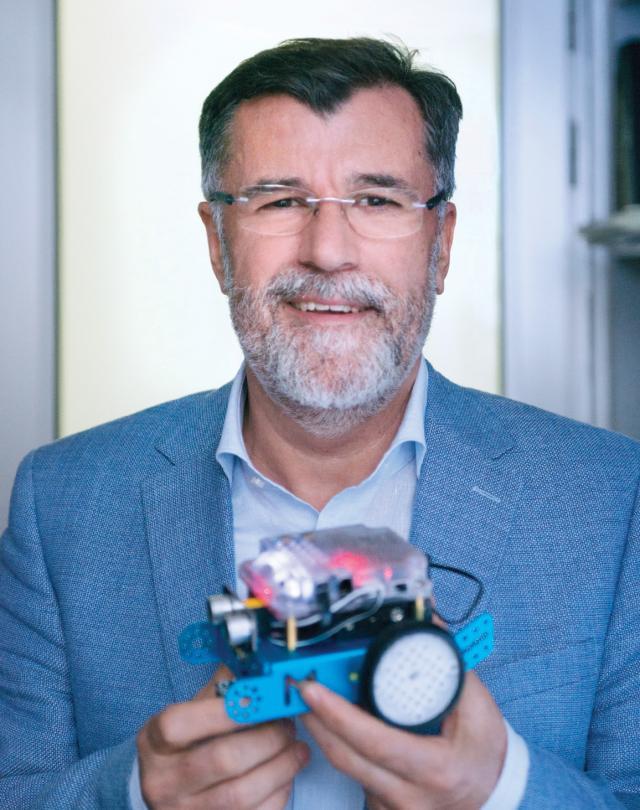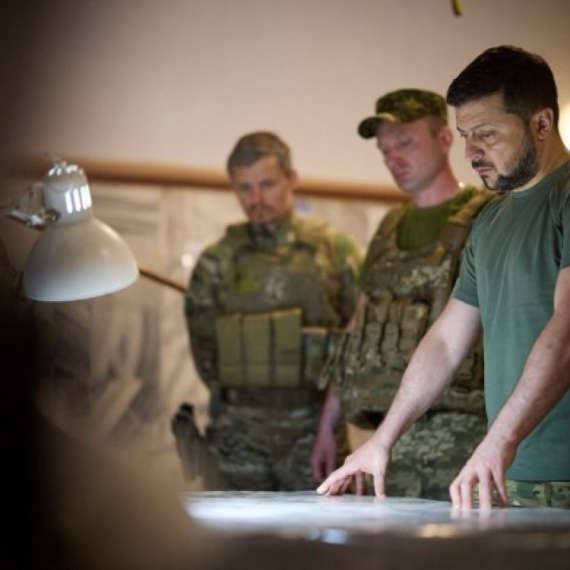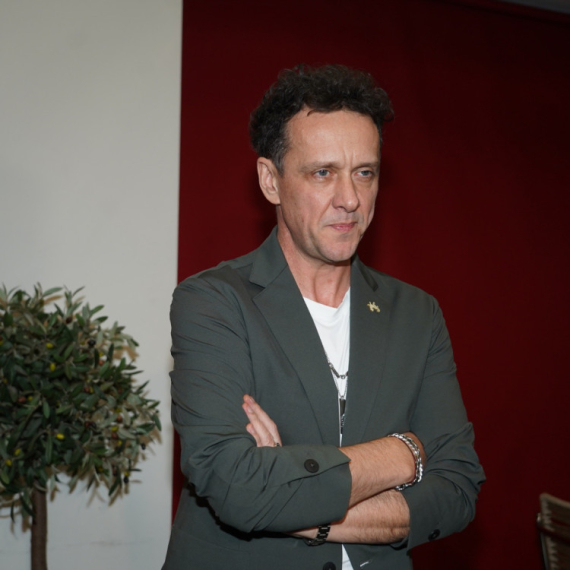"We need knowledge, not fake diplomas"
Thursday, 04.05.2017.
16:25

"We need knowledge, not fake diplomas"
While the public still debates over the number of IT experts needed on Serbian market, the decision of introducing informatics in schools as mandatory subject rom September had caused real panic, given that many schools in Serbia do not meet technical conditions for that. They need PCs, internet, licensed software, as well as trained personnel. In such atmosphere, at the beginning of this year, B92 Fund had launched national campaign “Battle for Knowledge”, with the goal of providing robots to all the schools in Serbia on which schoolchildren could learn programming and coding through playing. Up till now, 344 schools are engaged in the campaign, in 108 cities, while 1720 robots were distributed.How did you come to the idea to launch the campaign Battle for Knowledge?
Battle for Knowledge represents logical extension, while basically it is initiated with similar campaign being conducted in Croatia, led by Nenad Bakić, businessman and investor. I had followed his blog Eclectica for years, and suddenly there was a story about him launching a private Institute for Youth Development and Innovativeness (IRIM), part of which is launching the campaign Croatian Makers that introduces mBot, a kind of educational robot, robotics and informatics into school curriculum. I got interested for this story, as he was the sole investor, so I began following it and realized that the campaign was a success from the beginning. We had met in Zagreb, and I asked him for cooperation and his consent that we use their experience and knowledge. The first EUR 13.000 in our campaign was donated by IRIM, so 200 mBots for 40 Serbian schools was covered with this donation.
How many schools had applied so far?
We had announced invitation to schools on the press conference three months ago, and for the first 24 hours, more than 100 schools had applied. We had to stop inviting them after a couple of weeks as we realized that we will not be able to provide enough number of robots, and that it would be bad if we cannot meet the needs of all schools. In this first phase, 344 schools had been provided with five robots, and we had trained 536 teachers for using mBots in the classroom. Up till now, we had distributed 1.720 robots in 108 cities, within 17 school administrations, while we held 25 trainings. Large number of schools applies still and we will launch a new cycle as soon as the competition starts. This invitation will be open as long as there is interest for it on the part of the schools. Serbia has around 1.200 schools, while we expect that up to a thousand schools will apply.
Had state institutions shown readiness to get involved?
At certain moment in time, we offered cooperation to diverse state institutions. We had submitted application to the public call of the Ministry of Trade, Tourism and Telecommunications, that referred to education of teaching personnel, so we got initial funds from them, to be able to organize trainings for personnel. Afterwards, we had asked for support and consent of the Ministry of Education and were offered swift response that they are satisfied that we launched this campaign. Soon, Ana Brnabić, in her capacity as Chair of Ministerial IT Council expressed desire to get involved. She engaged herself in providing additional funds and together with UNDP (UN Development Program), we had gathered around USD 100.000 for the campaign, so we managed to close the circle of 344 schools.
Why did you choose this kind of robot?
Robot mBot is a classical learning tool that is being used in schools all over the world. We had calculated the ratio of price vs upgrade ability, and this was something that referred us to choose mBot. On the other hand, among other things, it uses scratch – programming language that is very simple. We had played it safe and selected the one that proved to be highly functional in Croatia.
Is there an option for regional connecting of schools and introducing regional competitions?
We have already an idea both in Croatia and in Serbia on organizing regional project, so that the story could extend on other states within the region, as all of them have the problem with informatics. With such regional project, we will have much more favorable climate when it comes to sensitizing pupils to accept informatics. On the other hand, this could be a good motive for cooperation and competition in the region, including establishing communication on the new programming languages.
To what extent are the teachers that went through training ready to learn and change the way in which they transfer the school curriculum to the schoolchildren?
One of the tests for their readiness is this invitation. Those who applied immediately realized this as a challenge, considering this to be important for both the children and themselves. On the one hand, they comprehend the importance of this project, and on the other, majority of them had certain experience. They either teach informatics or get in touch with this field in some other way, so we have absolutely no problem with the way they adopt knowledge.
What do you expect to achieve with this project?
We regard this primarily as a turning point with children and their parents when it comes to what seems to be the profession of the future. I believe that this will help in opening up the debate regarding the profession they will pursue. We will also create teaching staff that will deal with this kind of coding, but also on the upgrade of it with more difficult programs. Project opens up room for promotion of informatics and digitalization and the use of new technologies in other subjects.
Have you planned additional projects in the fields of education and informatics?
We have an idea that the next step should be micro:bit. This is a new project of BBC that they developed in cooperation with Microsoft, Amazon and other IT companies. Namely, they had produced practically a small computer consisting of motherboard, with available access to wi-fi and bluetooth. This is more sophisticated model for learning coding with much more programming languages and much bigger offer. Last year, BBC had provided every six-grader with the micro:bit that costs 15 pounds. Now, we prepare the analysis of the possibilities that we could be able to provide at least 10 micro:bits per six-grade class.
Is the Ministry of Education ready to take those steps?
The Ministry of Education had expressed readiness for that, but they lack funds. This is good for a start, as I think that there are funds for such projects in European funds and initiatives such as Berlin Process. There are also private donors, although I think that in the campaign mBots, our business scene is still quite inert, unlike the case with incubators. There is greater level of ignorance than expected.
Why do you think that businessmen show such attitude?
I don’t know. Incubator used to cost around EUR 10.000 and it was much larger sum of money, while in this campaign, mBot with all accompanying costs amounts to EUR 100, meaning EUR 500 per school. I thought that this would go smoothly, as even individually some people can donate robots to their old schools that they used to attend. I believe that this campaign hadn’t been perceived in the right way so far. I suppose that now, when we launch competitions, all will become simpler and clearer. It is still quite abstract now, especially when people lack knowledge about robotics and informatics.
On the other hand, the scope of humanitarian activities has been rather downsized in Serbia, and this is realistic reaction on what has been going on in the society in general. The society itself becomes more neurotic, highly polarized, negative trends and directions, so lots of people withdraw under such circumstances. Moreover, they often ask who stands behind this campaign. So, there is whole range of reasons, and among them is surely this uncertainty that exists in the economy, so everyone are quite reserved, waiting to see how they will pass this business year.
To what extent such individual campaign can have impact on the changes in the way of transferring knowledge within schools, if on the other hand, we lack reforms of educational system?
We cannot exert much influence. We can take out certain segment and do what we can with it, to make it compatible with an imagined modernization of schools. This is not an ad hoc campaign, we have made a kind of long-term agenda, which speaks in itself about our seriousness and desire to participate in this part of educational reforms.
In your opinion, why has the reform of educational system been postponed often and what are the gravest consequences of placing education on the margins?
The position of education has been devalued. The result of the educational process has been devalued for years as large number of those who are educated at the end of this process do not have the fulfilment. They do not have jobs. So, some of them go abroad to take up other businesses, as unfortunately, there is small number of those that go abroad to pursue the professions they were educated for. The same goes here, majority of them cannot get employment, so they take up jobs for which they hadn’t gone to school for.
What do you consider to be major shortcomings in the educational system?
The system eroded from within so for years we have educational staff attrition. The profession that used to be strong middle class of a society in the past, that people were proud of, now is gone to decay.
Also in the sphere of education, everything depends on political party’s staffing. As in business, all services linked with the state – public institutions, state service, schools, everything is subject to the Party’s personnel policy. Not a single system would be able to sustain such dynamics and so large number of people who serve as universal professionals, capable of dealing with health-care, educations, social policy, business, whatever is needed. This had devastated educational system, as well as health, so it is very hard to introduce reforms if you lack the substance that will implement them.
How much the knowledge has been devalued in the society in which fake diplomas and suspicious Ph.D.’s of the people on high positions are commonplace and nobody can do anything about it?
Massive privatizations and corruption in the leading state officials and business elite circles, where ignorance is being forced, while buying off diplomas had become common, had additionally contributed to destroying educational system. This hadn’t ruined only education, but also business, development on any possible level, as those diplomas had become a part of the whole system. The perception of education has been permanently destroyed, so this element will for a long period of time become a big hindrance for restoring the integrity and credibility of education.
Do you see that anyone in the ruling coalition is interested in resolving this issue of false diplomas?
I don’t see any effort in changing something with this regard. Corruption in the field of education and diplomas provision had become something ordinary, something common, and there are no serious attempts to stop this negative cycle and to create basis for change.
Those who should make this are those who used to buy their diplomas. On the other hand, there are people who consider themselves capable of dealing with all kinds of professions successfully, while no one sanctions them. There is no proof whatsoever that there is certain serious selection when it comes to the staff members in those fields. This level of corruption – buying diplomas – is followed by another corruption – buying off job positions, followed by the corruption within the business. We are in the vicious circle that is hard to stop as we need great courage, power and visionary thinking.
Of course, it represent big risk for such a decision to be taken, but I believe that we as a society will not be able to make any progress towards the future in which we can believe.
How we could explain the real value of knowledge to the youth in the atmosphere of absolute trivialization of knowledge?
The role of public services in a society is crucial. Public service is not just media service, but the role of public service as media should have enlightening role and larger number of curriculums that would deal with education, promotion of education in a modern way.
In any field of educational system, starting with the ministry, via directors, teachers, it is necessary to make a serious effort to place right people there, those who are ready and capable to introduce and implement modern educational models of learning. It is necessary to change the whole cultural model and this seems to be the problem with our country on the whole, because without serious change within cultural model in all social fields, we cannot do anything.
We should focus on individual work, on the role of individual, foundations, NGOs, that need to try to creative positive atmosphere with as much as possible projects, thus reforming the whole system, without waiting for an action plan, written by the Ministry or the Government, as this will not be successful.
Do you consider dual learning a good move? Who will benefit most from introducing this kind of educational model?
It is highly questionable where practical teaching will be carried out, what are facility capacities. We don’t have many possibilities, as we are not Germany or France that can offer large amounts of such knowledge. It is of utmost importance what we will offer as real knowledge, how and in what way, people will transmit their knowledge on entrepreneurship, business policy, that never existed in our elementary and secondary schools.
Therefore, this is still rather gloomy, but we should already know what are companies and professions within those companies, what are high quality professionals within those companies and what are the best ways of their offering knowledge.
Do you agree with the statements that dual education serves for creating new cheap labor force, as we base investor attractions on that?
When we stated the reasons why investors should come to Serbia, cheap labor and river clubs were mentioned, not expert labor. If we should really bring companies and if we should create serious production here, this could be one part of educational system. The other one could be this that brings new technologies and knowledge from the field of informatics.

























































Komentari 0